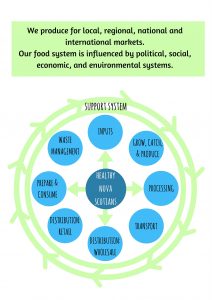
Grow Nova Scotia

GROW Nova Scotia: School Food is a project with a vision of a creating a Collective Impact initiative, representing all parts of the school food system, working together to increase local and healthy food in schools.
The Need
Local and healthy food choices start from a young age and have the potential to benefit a person’s health, education and long term rural economic sustainability. The Coalition for Healthy School food states, a student who has a meal every school day has a higher chance of graduating and estimates that each 1% increase in graduation rates could result in a $7.7 billion savings per year in Canada since high school graduates earn higher salaries, pay more taxes, have lower healthcare costs, are less likely to encounter the justice system, and are less dependent on social assistance.
Procuring local foods for schools, and other institutions, has wide ranging benefits and meets mandates across government departments, organizations and individuals involved in the school food system. In developing a framework that fosters collaboration, Collective Impact initiatives have provided solutions to complex social problems by aligning people toward working to develop and accomplish common goals.
We Are Better Together
Nova Scotia has an abundance of resources and opportunities for economic growth in the Agri-Food sector. By working together, we can be more efficient and stronger by aligning priorities, pooling resources and collaboratively fostering innovation in the province.
NSFA and the Grow Nova Scotia Committee is uniquely equipped to liaison between government departments, industry partners and with other not- for-profits across the Atlantic Provinces to work together to identify and overcome the challenges the Agri-Food industry faces.
GROW NS is designed to utilize the Collective Impact Framework which brings partners together around a Common Agenda, Common Progress Measures, Mutually Reinforcing Activities, Constant Communication all held together and facilitated through a Backbone Organization.
GROW Nova Scotia’s Guiding Values
Fairness– We strive to build a food system in NS where fairness exists among suppliers, producers, processors, retailers, and consumers.
Equity– We strive to build a food system that promotes dignity, fair working conditions, and access to healthy food.
Sustainability– The food system in NS must meet the needs of the present without compromising the ability of the next seven generations to meet their own needs- ecologically, financially, and socially.
Collaboration– We know that when people, organizations, and governments work together, more can be accomplished. We will work across and within the Nova Scotia food system to build a positive, collective impact.
Shared Benefits– We create viable solutions guided by real, measurable results for the Nova Scotia food system.
Defining Local
Interest in “local” food has grown dramatically over the last number of years. Public interest in buying local food is motivated by many things: food safety, supporting the local economy and local farmers, freshness and taste, and minimizing the use of fossil fuels in food transport. There are many definitions of “local” influenced by measuring food miles traveled or food produced within a province. Select Nova Scotia, a program developed by the Province of Nova Scotia to encourage Nova Scotians to shop and buy locally, defines local as produced in Nova Scotia. The Nova Scotia Federation of Agriculture also defines local as produced in Nova Scotia. The Canadian Food Inspection Agency defines local as:
- food produced in the province or territory in which it is sold, or
- food sold across provincial borders within 50 km of the originating province or territory

The CFIA recognizes that this is a broad interpretation of the current policy and there are a variety of views on how the term “local” should be defined. It is also important to note that in the “Buy Local Challenge” project conducted in 2008, by the Women’s Institute of Nova Scotia, 75% of survey respondents felt that food produced in the Maritimes (NS, NB, PEI) was considered to be local. Consumers vary in their own response to what is considered to be “local” food. This is will be explored further in the food system plan.
What is a Food System?
A food system includes all processes involved in feeding a population including growing, harvesting, processing, packaging, transporting, marketing, consuming and disposing of food and food related items, right back to nourishing the soil and protecting the water we use to grow food. The food system also includes the inputs needed and outputs generated at each of these steps. A food system operates within, and is influenced by, social, political, economic and environmental contexts. It also requires human resources that provide labor, research and education.
